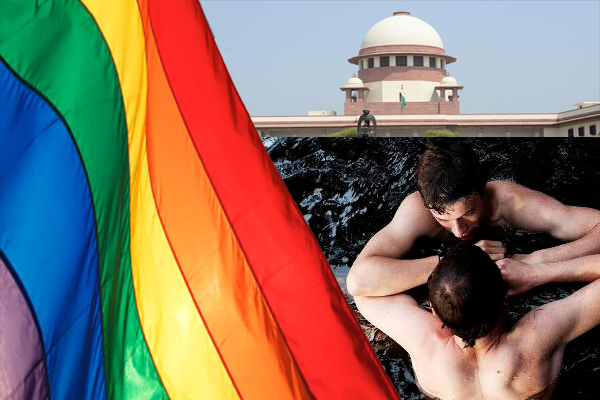
It is not crime to be gay in India anymore: Supreme Court
New Delhi, Sept 6 (IBNS): In a historic judgement that can be called a milestone in the movement for gay rights in India, the Supreme Court on Thursday ruled that homosexuality is not a crime in the country anymore with the top court moving to scrap Section 377 of the Indian Penal Code, a British era law that treated the practice as unnatural.
A five-judge bench headed by Chief Justice of India Dipak Misra delivered its verdict on whether Section 377 that holds gay sex as an offence in India, ruling that homosexuality is not an offence.
All judges concurred on their opinions and their viewpoint was 'take me as I am' and that prejudice cannot rule India. Outside the court and across the nation people celebrated.
The CJI said: "No one can escape from their individualism. Society is now better for individualism. In the present case, our deliberations will be on various spectrums."
"Respect for individual choice is the essence of liberty; LGBT community possesses equal rights under the constitution," the apex court said.
Holding that homosexuality is not mental disorder, the court said: "Autonomy of an individual is important. He or she can not surrender it to anyone"
“Section 377 is arbitrary. The LGBT community possesses rights like others. Majoritarian views and popular morality cannot dictate constitutional rights. We have to vanquish prejudice, embrace inclusion and ensure equal rights.”
"History owes an apology to the members of the LGBT community and their families for the delay in providing redressal for the ignominy and ostracism they have faced through the centuries," Justice Indu Malhotra of the bench said.
Besides Chief Justice Dipak Misra the bench comprises judges R.F. Nariman, A.M. Khanwilkar, D.Y.Chandrachud and Indu Malhotra.
In 2013, the top court had upheld gay-sex as an offence though this section was read down by the Delhi High Court in July 2009 in response to a Naz Foundation petition in the Delhi high court against Section 377.
That judgement was overturned by the Supreme Court on 11 December 2013 holding that amending or repealing section 377 should be a matter left to Parliament, not the judiciary.
Reactions also started pouring in on Twitter and other social media platforms.
Historical judgment!!!! So proud today! Decriminalising homosexuality and abolishing #Section377 is a huge thumbs up for humanity and equal rights! The country gets its oxygen back! ðŸ‘ðŸ‘ðŸ‘💪💪💪ðŸ™ðŸ™ðŸ™ pic.twitter.com/ZOXwKmKDp5
— Karan Johar (@karanjohar) September 6, 2018
RIP #Section377
— Ayushmann Khurrana (@ayushmannk) September 6, 2018
The new sunshine of this day is that of a progressive India. Love all!
In Aug 2017, the Supreme Court had held Right to Privacy as a fundamental right. It also ruled that sexual orientation is an "essential component of identity". In July this year the apex court began hearing petitions challenging Section 377 wth indications that it might be repealed.
Chapter XVI, Section 377 of the IPC dates back to 1860 introduced during the British rule of India, and it criminalises sexual activities "against the order of nature", arguably including homosexual acts.
According to it, Unnatural offence means: "Whoever voluntarily has carnal intercourse against the order of nature with any man, woman or animal shall be punished with imprisonment for life, or with imprisonment of either description for term which may extend to ten years, and shall also be liable to fine."
The Delhi High Court verdict of July 2009 was not challenged by the Government of India. Since then it was like a law in India. But the SC verdict of 2013 changed all that and gay sex again became illegal in India.
Support Our Journalism
We cannot do without you.. your contribution supports unbiased journalism
IBNS is not driven by any ism- not wokeism, not racism, not skewed secularism, not hyper right-wing or left liberal ideals, nor by any hardline religious beliefs or hyper nationalism. We want to serve you good old objective news, as they are. We do not judge or preach. We let people decide for themselves. We only try to present factual and well-sourced news.







